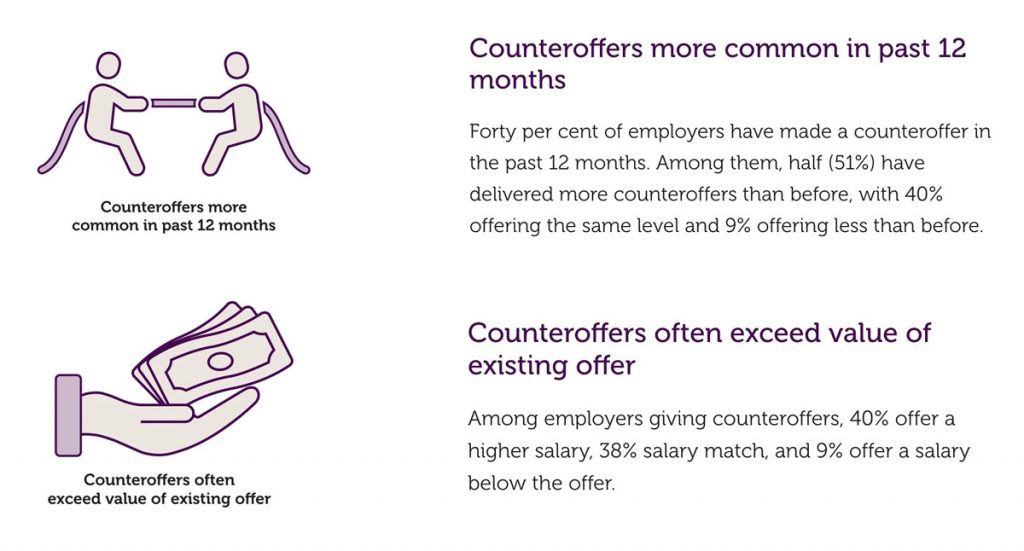“What’s up?” You ask, somewhat concerned with what may come next.
<Your team member takes a deep breath…>
“I’ve accepted an offer at another company. I need to give you my formal notice.”
Sooner or later every manager hears something like that. These words will always be painful for you to hear, especially if we are talking about a superb employee you can’t afford to lose.
What do you do?!?!
When you hear that a good employee is quitting, it’s common for a lot of questions to race through your head: How am I going to fill this role? Who's going to manage those key accounts? What will I tell the rest of the team?
Losing a team member always stings, but if you weren’t expecting it, it’s even harder.
Regardless of the reason, you want to handle it professionally. However, to do so you need to know how to respond to an employee resignation the right way.
Do you try to convince him/her to stay? Act indifferent? Probe for details? Let emotions show?
Those are all good questions that you ideally have answers to before this happens to you, because it’s much harder to react well at the moment if you’re unprepared.
The fact is, having employees quit is an inevitable part of management. But that doesn't mean you have to be unprepared when it happens. Today, we walk you through how to respond to someone resigning professionally and empathetically, so you’re prepared when the unfortunate moment comes.
We'll explore:
- Why you should pay attention when someone quits at work
- Why you shouldn’t take it personally and how to stay professional
- How you can understand their reasons for leaving to improve yourself
- How to maintain a positive relationship with them going forward
- The importance and ways to work together on a transition plan
- The proper way to tell your team about the resignation
The more prepared you are for resignations, the better you can handle them with care for the individual, your team, and your company. Let's get started.
Why You Should Pay Attention When Someone Quits at Work
When an employee gives you their resignation, it can be tempting to just let them quietly finish up their remaining time and head out the door without much fanfare. No uncomfortable dialogues, no stress, no need to get out of your comfort zone.
Keep it simple and discrete, right? No. Trying to ignore, or hide the fact that your teammate quit is a big mistake.
If you simply disregard this situation, your team may think you don't care about them. Rumors can also quickly spread which with a better plan you’d get out in front of.
Equally important, trying to hide the departure can leave your team in a bad spot; what if someone really needed something from that person, but found out too late?
How you handle an employee leaving sends a powerful message to everyone on your team.
One person leaving can be the start of a turnover wave
In the worst case scenario, ignoring or hiding a resignation can lead to a cascade of employee turnover.
When one person quits, it can motivate others on your team to reevaluate their situations and consider looking for opportunities elsewhere, too. And if you handle the resignation poorly, that can further frustrate any team members on the fence about staying.
It’s often also a sign of problems that are bothering more than just the one person on your team who already quit. Fix any of those problems now, or be prepared for more of your team quitting.
When someone turns in their notice, don't stick your head in the sand. You need to take action. Have an open and thoughtful discussion to understand why they're leaving and see what you can improve for those remaining on your team, while creating an effective and professional transition for the employee that’s already leaving.
Want to learn more? Discover 5 ways to spot and stop employee turnover waves in our in-depth guide.
What is the Proper Way to Respond When Someone Quits?
When an employee resigns, how you respond in those first conversations with them about it can dictate much more than you may realize. There are major stakes to consider:
- They will talk to their best friends at work and share details about how the resignation discussion went. Were you understanding and professional, or did you get angry and defensive? These details will then spread to the rest of your team through back-channels and shape how the rest of your team thinks of you..
- Employees, who decide to quit are unofficial ambassadors for your company. They will tell others who are looking for jobs whether your company is a good place to work long-term or one to avoid either in conversations in their network, or by posting to sites like GlassDoor.
- You will determine how cooperative the employee will be in their final days. Will they work hard and wrap up projects properly? Will they hand off and document their work well or mail it in? If they mentally check out early, they can poison the well and encourage others to leave.
When someone quits, it's crucial to respond the right way. How you react makes all the difference, both for the departing employee and those team members staying on. Let's explore the proper response to employee resignation in more detail.
Don’t Take it Personally and Stay Professional
This is the most important advice to remember. No matter what they say or the relationship you had leading up to this, you need to stay professional, calm, and cool in this conversation.
When an employee tells you they are resigning, it's understandable to initially feel surprised, disappointed, or even hurt. But as a leader, you need to stay composed in the moment.
If you have been reading our posts previously, then you may have seen that we often say that people leave managers, not companies. However, you must understand that we do not consider this as the only reason people leave. The desire to quit may have nothing to do with you or the company. A better position, a higher salary, or even just family circumstances may be the reason for leaving the organization.
Regardless of the rationale, resist the urge to take it as criticism of your management abilities. Don't let your ego or emotions get the better of you. Your priority is to maintain professionalism and a positive relationship.
When you first hear the news, take a deep breath and focus on what must be done. You can reflect privately later on how you can improve (and we’ll have more on that later in this post).
Here’s what you should do first.
Questions to ask when an employee decides to resign
These questions will help you gather the most important information in those critical first moments after you hear about an employee's resignation:
- Have you already accepted the offer and is there any flexibility on the start date? This will help you understand how much time you have for a transition, and what options you may have if you think you need more than 2 weeks to transition well.
- Who, in your opinion, has the best skills to replace you and your most important roles? This gives insight into picking the right person to hand off their responsibilities and key tasks to. They’ll often know who best understands their work, and have valuable opinions on true skill levels.
- Can you make a list of critical tasks to transition? No one knows their job better than the person doing it, so get their help in determining what needs done before their last day.
- How much time do you think you need to document and train others? This is great for comparing your estimate to theirs. If you think it will take much longer, it’s better to discuss this upfront instead of trying to convince them to do extra on the last day.
Asking these questions can help ensure the most important parts of their departure are mutually understood and get you both taking action. The plan for their transition and handoff is most critical to avoid big disruptions and problems for your team, and gives your departing team member a clear way to leave on a positive note.
With that in hand, you can move on to the next thing you’re likely really looking to learn about from them: why they’re leaving.

Understand their Reasons for Leaving Your Team
Every manager is at least a little curious about why a team member chose to leave. This is especially true for your most valued employees, who you wish had stayed.
Unfortunately, you’re not always going to get clear answers. Many people want to leave on good terms and avoid rocking the boat. They may try to tell you what they think you want to hear, or what they feel is most diplomatic. Or if they’re upset about some things you may get some ranting and complaints, which even then may only be part of the picture.
Regardless of what you hear, take what they share with a grain of salt.
And most importantly, no matter what you hear, remember to stay calm and listen. Even if it's hard to hear, or is directed specifically at you, take it as an opportunity to grow and do your best to reflect instead of react.
Here’s some example questions you can ask, so that you can better understand their reasons for leaving:
- What excites you most about your new role? This often reveals what was lacking in their current position.
- What will you miss most here? This helps identify positives of your team/company.
- What could we have done to make you stay? They likely won't change their mind, but might get them talking a bit about things that motivated them to start interviewing.
- When did you start looking? This can help you understand how long they may have been unhappy. You can then look back at your prior 1 on 1 notes to see what warning signs you may have missed.
- What feedback do you have for me? This one requires you to be brave, but if you have some rapport and trust with them, they may share constructive criticism for you.
Asking a few questions like these can help you learn what you can from their departure so you can improve as a manager, and avoid any mistakes you may have made that contributed to their resignation.

It's tempting to try to keep a valuable employee by making a counteroffer when they resign. But research shows this is rarely effective. It’s note worth it.
According to research by LiveCareer, 57% of all employees who accept counteroffers change companies within the next 2 years. Other research also shows that 50% of candidates who accept a counteroffer are back in the marketplace looking again in just two months. Either way, it means that employees you retain with a counter offer are probably still looking for new roles, and are still likely to leave.
So why don't counteroffers work? It's rarely just about the money. Common motivations include:
- Boredom with their work and desire for new challenges. They may feel stuck in a rut doing the same routine tasks and crave learning new skills and taking on different projects. More money doesn't make boring work suddenly engaging.
- Conflicts with teammates or management. Interpersonal issues and lack of trust are hard to overcome with a simple financial incentive, especially if you have jerks and toxic individuals on your team, or other teams they deal with regularly.
- Lack of advancement opportunities. If they can't get promoted at your company and another company will give them the next step up, you will probably lose them, and would have a harder time matching their new compensation..
- Poor cultural fit. If your departing employee feels out of place in their role or with your team, they won’t want to stick around. There’s no amount of money that makes up for feeling unwelcome, or if the values of your company conflict with their own.
These issues aren't solved by simply offering more compensation. And even if they accept, you've likely just delayed their inevitable departure. As a manager, you should aim to proactively retain your best talent, not reactively throw money at them once it's too late.
Further Reading:
- Learn how to provide growth opportunities, even if there are few promotions in our post on Employee Development: How To Grow Your Employees When You Can't Promote Them.
- Find out How Managers Can Cause Low Employee Morale and how to avoid it.
Discover tips for How To Change The Culture Of Your Team to create an engaging environment.
Maintain a Positive Relationship
It's important to part ways on good terms and maintain a positive relationship with departing employees. Even if you didn’t particularly like them, or are glad they’re leaving, it does you no good to be sour or negative.
Remember: Your current team members are watching how you handle resignations. Don’t signal to them that you’re two-faced and only treat them well as long as they can do something for you.
Your reputation lingers with ex-staff as much as your current team members. You never know how many potential applicants are warned away from your teams through word of mouth, or who are friends with whom and won’t appreciate your negative comments about the departing team member.
Here are some tips for how you can leave the best impression at the end:
- Express Appreciation. Thank them for their contributions and highlight their accomplishments.
- Offer References. Provide a reference for future opportunities if deserved, but never attest to something you don't truly agree with. You can do this by offering to provide it upon request or by writing a public one on Linkedin.
- Ask for Referrals. If you’re on good terms, it can’t hurt to ask them if they know of anyone interested in their role. However, it only works if your ex-teammate is a solid performer, because usually C players recommend D players. There’s no point in replacing a poor performer with some as bad or worse.
- Stay Positive. Even if you're glad to see them go, take the high road. You don't want to provoke them to speak badly of your team or company after they leave, nor poison the well on their way out. If you don’t have a lot to say that’s positive, then simply say less.
Handling resignations constructively demonstrates care for your people, both current and former. Take this step seriously, as it can leave a lasting impression on more people than you may realize.

A lesson in last impressions… with a rocking chair
My father ran an accounting firm in Pennsylvania for nearly 20 years. During that time, his leading cause of turnover was retirement. He retained his employees, because he really cared about them, and showed it in many ways.
I was lucky enough to learn a lot of great leadership lessons early on from him, and one of them was about the Rocking Chair.
When an employee was retiring, they’d have a big luncheon to honor them and let everyone share stories about working with them. Then, at the end of the lunch, my father would present them with a handmade, beautiful rocking chair made by local Amish.
I recall one of those events where I asked my father, “Why get them such a nice gift when they’re leaving?”
To which my father wisely said, “I don’t get the rocking chair for them. I get it for the rest of the team to show that I care for people all the way to their last day and beyond.”
It’s no surprise that now that my father is retired, he still keeps in touch with many of his staff, who have many fond memories of working with him. Many still sit in their rocking chairs, remembering the leader they worked for.
You don’t need to buy rocking chairs for your employees when they leave, but you absolutely should think about the last impressions you make on them and those watching.

Work Together on a Transition Plan
When an employee resigns, collaborating with them on a detailed transition plan is crucial for ensuring their unique knowledge, skills, and responsibilities are smoothly handed off. Without it, you will almost certainly end up with unforeseen problems, missed assignments, and other frustrations for you and your team.
The typical notice period in the US is 2 weeks, but for more senior or specialized roles it may be 1 month or longer depending on the situation. You can ask for more, but remember that the time you have depends on the start date of their new job and how flexible they’re willing to be.
That’s why you need to create a clear plan together so nothing is missed. The more critical or senior their role, the more likely this plan needs to be very detailed and lengthy.
A few tips you can apply to make this transition smoother:
- For crucial roles, ask if they can they work part-time or flex their hours after starting the new role. This helps ease the burden on any replacements stepping into their shoes, and can buy you a bit more transition time if needed.
- Are they open to a short-term consulting agreement after they leave? In other cases, it may make sense to compensate them to be available to answer questions and train others later. For instance, if you don’t have their replacement on staff, getting them to help out part-time once you do may be helpful or necessary.
- Establish clearly how they’ll specifically hand off information. There are many ways to document and teach others. Make sure you come up with a process that is reasonable for them and useful to your team. This can include screen recordings of workflows, detailed Google Docs, in-depth manuals, audio recordings of instructions, etc.
- Identify and train other team members to take over their key responsibilities. They’re obviously going to at least give basic information to others who need it, but it can also be helpful to get their input on who they think is best to train to fill their role. By clearly establishing it, you’ll also know who to check with to confirm it goes well and they get what they need.
The devil is in the details when it comes to a good transition plan, so make sure you stay organized and focused on these areas.
What should the transition plan look like?
Now that you’ve learned why they decided to leave, and you understand their perspective on high level details for the transition, it’s time to specifically create the plan.
The transition plan itself should comprehensively outline:
- A detailed timeline for completing knowledge transfer activities and handing off active tasks and projects to other team members.
- Exact details for how they’ll hand off key information. This should include any of their unique expertise, tribal knowledge, workflows, and job context. It can be done via recordings, documents, job shadowing sessions, etc, but regardless should specifically outline what it will be so you can check that it happens.
- Follow-up contact information, so you and your team can easily contact them after departure with any follow-up questions (email, phone, LinkedIn). If they provide multiple methods, ask them to note which approach is best for various situations (especially emergencies vs. non-time sensitive questions).
- Introductions to key external partners, vendors, or clients the employee interacted with to enable relationship continuity. This is especially important if your team member worked often with those outside your company. A warm intro from them to their replacement or fill-in can smooth the transition.
The details really matter here. The best thing you can do is create a mutually agreed upon checklist. That makes it easy to ensure you’re both on track, and that everything critical gets done before they leave.
What about weak or poor employees?
Everything we’ve talked about is focused on the idea that this is a good or great employee. These are the people you both don’t want to lose, and will have been doing great work you need someone to pick up the slack for.
Yet, that’s not the only type of employee that may quit your team. Sometimes low performers will also give their notice.
In those cases, you may instead want to isolate them. Encourage a quick exit (possibly even less than 2 weeks notice) if you’re worried they're disruptive, or don’t really have any critical work to hand off.
Notify Your Team
Once an employee's resignation is confirmed, it's important to let the rest of your team know. Saying nothing allows rumors to spread instead and creates unnecessary anxiety among the rest of your team about what's going on.
As soon as you and your departing team member have the basics agreed to on their departure, it’s time to let the team know. Don’t wait, because the longer the gap between them giving you notice and you telling the team, the more likely gossip and rumor will spread.
Stay positive no matter what
How to announce employee departure? Well, when notifying everyone, first focus on thanking the leaving team member for their contributions and wishing them the best in their future. Venting frustrations never leaves a good impression. Your task is to send them off on a high note with the team, especially if they are really great performers.
Take the high road no matter the circumstances. Even for weak employees, say little before you say anything critical. Remember the story about the rocking chair; it’s as much about them as it is what you show your remaining employees.
Focus on the transition
Since you’re notifying your team quickly after receiving the news yourself, you can transition the note to your team to also cover transition details.
The first question that most employees will have after hearing someone is leaving is how the person’s work, projects, and relationships will be handled. If at that time you already can show them the start of a plan, you’ll relieve a lot of stress and show strong leadership.
Check in with your team
While most of handling an employee departure is about you and the employee leaving, don’t forget the rest of your team.
You should expect people to have an emotional response to the person leaving, as well as potential questions about the transition process.
It’s important to make yourself available to address any concerns team members may have about the upcoming change, as well as hear out anything they want to say about it. Be willing to listen and use your 1 on 1s as an effective time to privately discuss all of this with each team member.
By notifying everyone quickly and proactively, staying positive, showing empathy and listening to everyone, you demonstrate care for your team during a key period of change. It proactively eliminates many concerns they may have and keeps everyone focused on a successful transition.
Final word
How you respond to employee resignations is a true test of your leadership. It's often said that adversity doesn't build character, it reveals it. The same goes for employee departures.
Your reactions in these difficult conversations signal what kind of manager you really are to both the person leaving and the rest of your team. Who are you:
- One who cares about your people? Or only cares about production?
- One who can face hard truths with empathy? Or who ignores criticism and knee-jerk reacts?
Your team is always watching, especially when someone quits. How you handle it sends a message — not just to the remaining employees, but to the departing ones also. They may be your best brand ambassador or harshest critic going forward. And now you’re prepared.
Further Reading:
- Learn how to re-engage disengaged and underperforming employees in our guide on How To Turn Around A Disengaged Or Underperforming Employee
- Discover tips to create an exceptional onboarding experience that retains new hires long-term in How To Improve Your Employee Onboarding Process & Prevent Turnover.
- Understand the top reasons great employees quit and actionable ways to retain your top talent with 14 Reasons Why Great Employees Quit Your Team (And How To Keep A Good Employee From Quitting)





